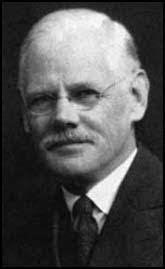Rowntree, Seebohm B.

Bio: (1871-1954) British sociologist. Seebohm Rowntree studied chemistry at Owens College in Manchester. He did not continue his studies and did not obtain a degree in any field of social sciences, nor did he teach at any educational institution. He spent most of his life running a factory owned by his family. However, Rowntree was a self-taught scientist who studied society and economics. He wrote a large number of books on various topics and had a great influence on sociology and social policy.
As he was interested in the issue of poverty and the standard of living of ordinary workers, he decided in 1899 to conduct a large empirical study of the standard of living of working households in York, a county in England, where he lived and worked. Rowntree was inspired by an earlier study of poverty conducted by Charles Booth. During the work on this study, he examined the living conditions, salaries, and expenses of over eleven thousand working households. His research aimed to determine the percentage of households living in complete poverty.
To establish this, he introduced a distinction between "primary" and "secondary" poverty; primary poverty affected households that really cannot cover the basic expenses of their income, while in secondary poverty were those households that spend money on unnecessary things and are therefore poor. In addition, he calculated the minimum costs necessary to cover food, clothing, and basic necessities in the house, and this minimum varied in relation to the size and composition of household members. At the end of the research, the results of which were published in the book Poverty (1901), Rowntree found that 15% of the working population of York lived in complete (absolute) poverty. Half of the poor were in that situation due to low incomes, while a fifth was poor due to a large number of members of the household. He concluded that a large number of working households, over time, go through periods when they are below and when they are above the poverty line.
Rowntree conducted similar empirical research on poverty two more times, and the results of that research were published in the books Poverty and Progress (1941) and Poverty and the Welfare State (1951a). In the second and third surveys, Rowntree also included expenditures for books, beer, tobacco, vacations, and similar items in the list of necessary household expenses. Despite expanding the list of necessary expenditures, in both later surveys, he found a reduction in the absolute poverty rate (18% in the second and 1.5% in the third survey). In addition, the third study examined the extent to which post-war welfare state measures had in reducing poverty in working-class households, and found that these measures significantly contributed to poverty reduction.
In the book The Human Needs of Labour (1918), Rowntree calculated the minimum household budget that would cover some other costs, and based on that, he determined what the minimum wage, for whose introduction he advocated, of the worker should be. Rowntree believed that there should be cooperation between managers and workers in the economy. He also researched the way people spend their free time, and that research is presented in the book English Life and Leisure (1951b). Rowntree has significantly contributed to the development of sociology and social policy, by developing research methodologies, and theoretical contributions and formulating proposals for practical measures directed to the reduction of poverty.
Fields of research
Classes Family Industry Management Poverty Rural Social Policy State Time Unemployment Working ClassMain works
Poverty, A Study of Town Life (1901);
Land and Labour: Lessons from Belgium (1910);
Unemployment: A Social Study (1911);
How the Labourer Lives: A Study of the Rural Labour Problem (1913);
How far it is Possible to Provide Satisfactory Houses for the Working Classes at Rents Which They Can Afford to Pay (1914);
The Human Needs of Labour (1918);
The Human Factor in Business (1921);
The Responsibility of Women Workers for Dependants (1921);
Industrial Unrest: A Way Out (1922);
Poverty and Progress (1941);
Poverty and the Welfare State (1951a);
English Life and Leisure (1951b).

